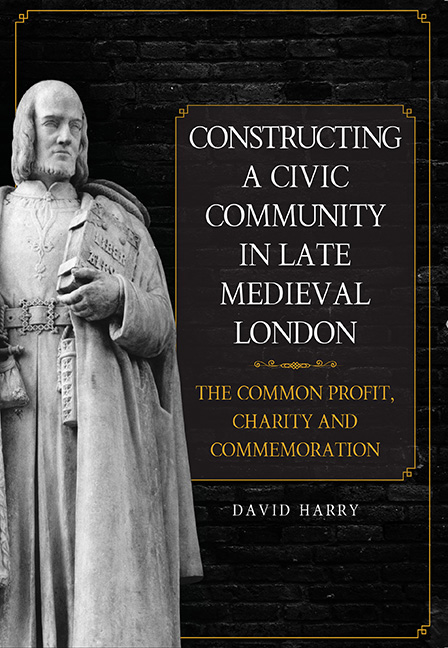Book contents
- Frontmatter
- Dedication
- Contents
- Acknowledgements
- Abbreviations
- Introduction: Common profit and charity in late medieval London
- 1 Radical London, 1376–86
- 2 Reconfiguring political authority
- 3 Civic ceremony and staging the limits of authority
- 4 The exemplary dead
- 5 Spiritual authority and the common profit
- 6 Print and the pursuit of the common profit
- Conclusion
- Bibliography
- Index
1 - Radical London, 1376–86
Published online by Cambridge University Press: 04 April 2019
- Frontmatter
- Dedication
- Contents
- Acknowledgements
- Abbreviations
- Introduction: Common profit and charity in late medieval London
- 1 Radical London, 1376–86
- 2 Reconfiguring political authority
- 3 Civic ceremony and staging the limits of authority
- 4 The exemplary dead
- 5 Spiritual authority and the common profit
- 6 Print and the pursuit of the common profit
- Conclusion
- Bibliography
- Index
Summary
An ‘urban oligarchy’?
In the autumn of 1386, Nicholas Exton, fishmonger, was elected to his first term as mayor of the city of London (he would serve again, 1387–88). His election marked the end of a decade of radical – and at times violent – reform. Although his election did not bring about the end of violence in the capital (Exton's predecessor and close political ally Nicholas Brembre would be executed following his accusation and betrayal by Londoners at the ‘Merciless’ Parliament of 1388), Exton's election brought about relative stability and the city settled into a ‘comfortable but reasonably benign oligarchy’. Radical violence does not always take the form of physical harm or the loss of life and we might also consider non-cooperation, or change to systemic processes, as an alternative form of violence. In this sense, between 1376 and 1386, London's governors faced both forms of violence at the hands of the artisanal classes and minor guilds who supported the rebels of June 1381 and whose representative, the draper and mayor (1381–83) John of Northampton, challenged the monopoly of the traditional locus of power within the city.
London in the fourteenth century was effectively governed by a mayor and twenty-four aldermen, drawn almost exclusively from five of the city's more than one hundred guilds. These men were predominantly involved in wholesale distribution and overseas trade, that is to say, they were vintners, fishmongers, grocers, mercers and goldsmiths. These men dominated the economic and political landscape of the capital and exercised influence over both trade and ideology. They saw their contribution as not only enhancing their own wealth, but also the prosperity of England. The status of these individuals – and the influence they could wield – meant that the office of alderman was greatly desired, though restricted to few. After 1469 those elected to the office were to have goods, chattels and recoverable goods of a value of no less than £1,000 – a sum prohibitive for all but the wealthiest citizens.
In c.1419 the common clerk of the city of London, John Carpenter, in his compilation of the ordinances and charters of the city, the Liber Albus, described the ideal qualities of an alderman. He was to be ‘without deformity of body, with wisdom and discretion of mind, wealthy, honest, loyal and free’.
- Type
- Chapter
- Information
- Constructing a Civic Community in Late Medieval LondonThe Common Profit, Charity and Commemoration, pp. 23 - 40Publisher: Boydell & BrewerPrint publication year: 2019



